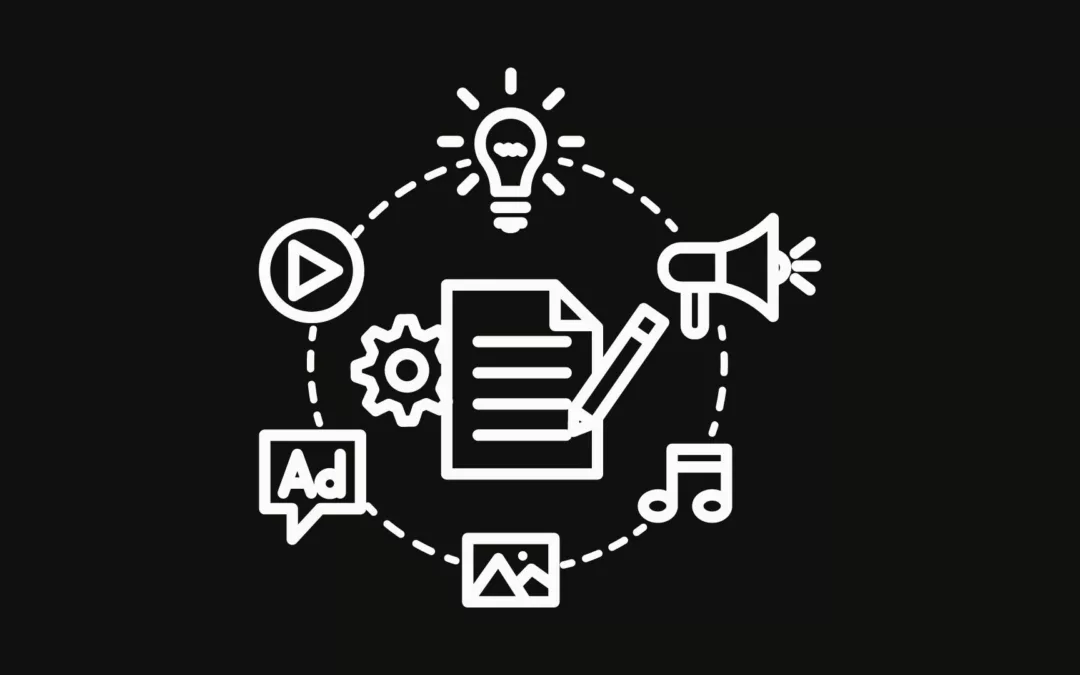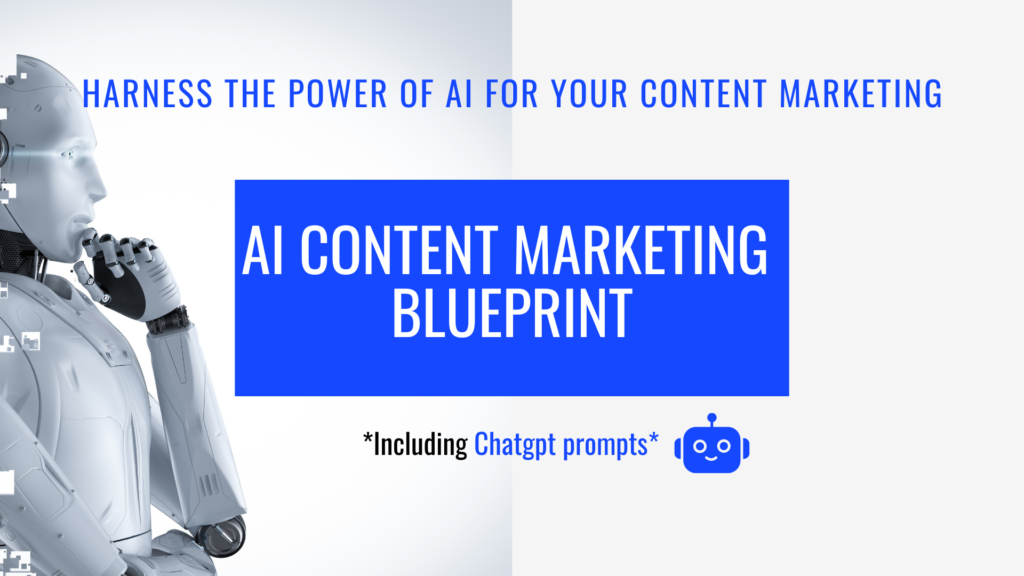The Game: AI for Content Marketing
I like to think of using AI for content marketing as a game: there are players, rules, competition, fields of play, and a strategy for winning. Here’s one of my favorite quotes about strategy,
“Strategy is knowing where to play and how to win” (Harvard Business Professor Frank Cespedes).
As you know, content marketing has become a vital part of any successful business strategy. With the rise of AI, businesses now have the ability to take their content marketing strategy to the next level.
In this blog post, we’ll look at 5 ways AI can help you know “where to play and how to win” so you can level up your content marketing game.
Ready? Let’s put together your winning AI Content Marketing game plan.
1. AI for Personalization
Think of this like “personalized playbooks”. Although your audience may be in one specific niche, their individual interests and behaviors are likely varied. The more personalized your content is to your target audience, the more likely your audience is to engage.
Here are some examples of how AI personalizes content that you’re probably already familiar with:
- Content recommendations: AI algorithms can analyze user behavior, preferences, and interests to create personalized content recommendations. For example, Netflix uses AI to recommend movies and TV shows to users based on their viewing history.
- Dynamic content: AI can also be used to display different content to different users based on their behavior. For example, an e-commerce website could display different product recommendations to users based on their search history and purchase behavior.
- Chatbots: AI-powered chatbots can personalize the user experience by providing personalized responses to user inquiries. For example, a chatbot for a clothing website could provide personalized recommendations based on a user’s style preferences and purchase history.
How to win: Use AI to personalize your content, so you can provide a more engaging and relevant experience for your audience and more conversions for your business. When creating content using AI make sure to specify not only your own brand-specific elements but also who the audience is and what they need from the content.
We’ll cover more of this in our next strategy…
2. AI for Content Creation
The most obvious “power play” you are most likely aware of is the ability of AI like ChatGPT, Jasper.ai, Copy.ai, and more to create content at scale.
AI-powered content creation tools are becoming more advanced and can now generate high-quality content automatically. These tools use natural language processing (NLP) and machine learning algorithms to analyze existing content and generate new articles, blog posts, and social media updates.
These tools can analyze a topic, understand the context, and generate content that is not only coherent but also informative and engaging. While AI-generated content may not replace human writers completely, it can save time and resources and provide a starting point for further content development.
*Pro-tip: Make sure you edit content to match your tone of voice, aka, it needs to “sound like you”. You might be able to get a fully AI-written blog rephrased to get past plagiarism and AI detectors, but your audience will likely be able to tell that you didn’t write it. Maintaining the authenticity of your brand is crucial. Trust is built on brand consistency.
Need help with AI-powered content creation? Download the AI Content Marketing Blueprint to get a step-by-step method for speedy content creation. Includes a Free Notion Template to 10x your content creation with audience–specific content, keywords, multiple attention-getting blog titles per topic, and automated blog writing.
How to win: Use AI to help you create an outline or first draft of your long-form content (blog, article, video, or podcast). Then, edit it to make it your own.
Now that you know how to play the game. How do you get better? Let AI be your content optimization coach.
“Coaching works because people learn by doing what they would have done anyway – just smarter, faster, better, and with support and feedback.” Consulting Today
3. AI for SEO Optimization
AI is great at analyzing “game films”, to optimize your content.
Search engine optimization (SEO) is done by analyzing search patterns and identifying the most relevant keywords and topics for your content. AI-powered SEO tools can provide insights into what your target audience is searching for and then help you optimize your content accordingly.
Here’s how AI can help:
- Keyword research: AI-powered SEO tools can analyze search patterns and identify the most relevant keywords for your content. This can help you optimize your content for search engines and increase your visibility in search results.
- Content optimization: AI can analyze your content and suggest changes to improve its relevance and readability. For example, AI algorithms can identify opportunities to include relevant keywords and improve the structure of your content.
- Link building: AI can analyze your backlink profile and suggest opportunities for link building. This can help you improve your search engine rankings and drive more traffic to your website.
- Competitor analysis: AI-powered SEO tools like SEMRush and Ahrefs can analyze your competitors’ websites and identify opportunities to improve your own SEO strategy. This can help you stay ahead of the competition and improve your visibility in search results.
How to win: AI tools can help you create a list of keywords to use in creating content that is going to be most appealing to your audience and that is most likely to get attention on Google. The AI-driven tool writerzen can even help you to pinpoint the keywords that are being searched often but not written about – these are hidden gems that may even help you show up on page 1 of search results.
4. AI for Content Distribution
This is the most recognizable “where to play” facet of content marketing that so many entrepreneurs don’t think enough about. Besides contextualizing your content for different platforms, both long and short form, AI can help determine when to post, where to post, and how often.
Time Out! The mistake entrepreneurs in the start-up and growth phases make is thinking they need to be on every platform immediately or continuously. So, how do you know what platforms to focus on first? The way I think about it is this: “Where are you most likely to win?” That’s where you play. Double down on providing great content there, then think about expanding.
AI helps with content distribution in the following ways:
- Optimal timing: AI algorithms can analyze user behavior on social media and other digital channels to determine the best time to distribute content. This can lead to higher engagement rates and more traffic to your website.
- Targeted distribution: AI can analyze user behavior and preferences to determine the best channels to distribute content. For example, AI algorithms can identify which social media platforms are most popular among your target audience and prioritize distribution on those platforms.
- A/B testing: AI-powered A/B testing tools can help you optimize your content distribution strategy by testing different variations of your content to see which performs best. This can help you identify the most effective distribution channels and messaging strategies.
How to win: To be a champion you need stamina. That means avoiding burnout if you’re an entrepreneurial athlete. In the AI Content Marketing Blueprint, I include tips on how to choose the best social media platforms for your brand and exactly what prompts to use with chatGPT to make creating captions, posts, and tweets fast and easy.
5. AI for Analytics
When the whistle blows, you’ll know if you’ve won or lost by looking at the scoreboard. In content marketing, the scoreboard is your analytics dashboard. AI-powered analytics tools can provide deeper insights into user behavior and content performance. These tools can analyze data from multiple sources and provide actionable insights to help you optimize your content strategy.
This is not only your own scoreboard, but it’s also a “game film” analysis and real-time game commentary.
Here are some AI-powered analytics tools to consider:
- Google Analytics: Google Analytics uses machine learning to provide insights into user behavior and content performance.
- Adobe Analytics: Adobe Analytics uses AI and machine learning to provide insights into customer behavior and optimize marketing campaigns.
- IBM Watson Analytics: IBM Watson Analytics uses AI to provide insights into data and help businesses make data-driven decisions.
- Tableau: Tableau uses AI and machine learning to provide insights into data and help businesses visualize and understand their data.
Please note that this is not an exhaustive list (not even close). There are more and more AI-powered analytics tools available every day.
How to win: Read the following pro tip!
*Pro tip: There’s marketing and then there’s growth marketing. If you want your chance at the pros, think like a growth marketer.
Most entrepreneurs spend 90% of their time focusing on the top of the funnel—lead generation. But growth marketing means paying attention to the entire funnel. Here are two things to do that will get you out of the amateur league:
- Run lots of plays in practice. Don’t wait six months to see if your SEO strategy is producing results. Instead, set up small experiments for short timeframes and be clear about what tells you if it’s a winning play. Example: A/B test a blog title for 1 week and determine the winner by most clicks.
- Know what “winning” looks like (conversions). The most common problem expressed to me by entrepreneurs is this, “My social media (content) marketing isn’t converting.” To which I answer, “What do you mean by converting?”. There’s a difference in what counts as a conversion depending on where in the funnel the conversion takes place. If you are expecting sales conversions based on the five YouTube videos you posted on your brand-new YouTube channel, you might think you’re losing. You might be playing on the right field, but winning (conversions) isn’t defined by how many sales you made. Winning (conversions), in this case, is better defined by another metric, i.e., watch time, engagement, watching consecutive videos, etc. In other words, you can’t dominate the division by practicing free throws in your driveway. But you can improve your free-throw percentage.
AI for the Win
AI technology is changing the way we play the game of content marketing. By leveraging AI tools for personalization, content creation, SEO optimization, content distribution, and analytics, businesses can take their content marketing strategy to the next level. Whether you’re an amateur or in the pro league, AI can help you create more effective and engaging content that helps you win. Good luck!


